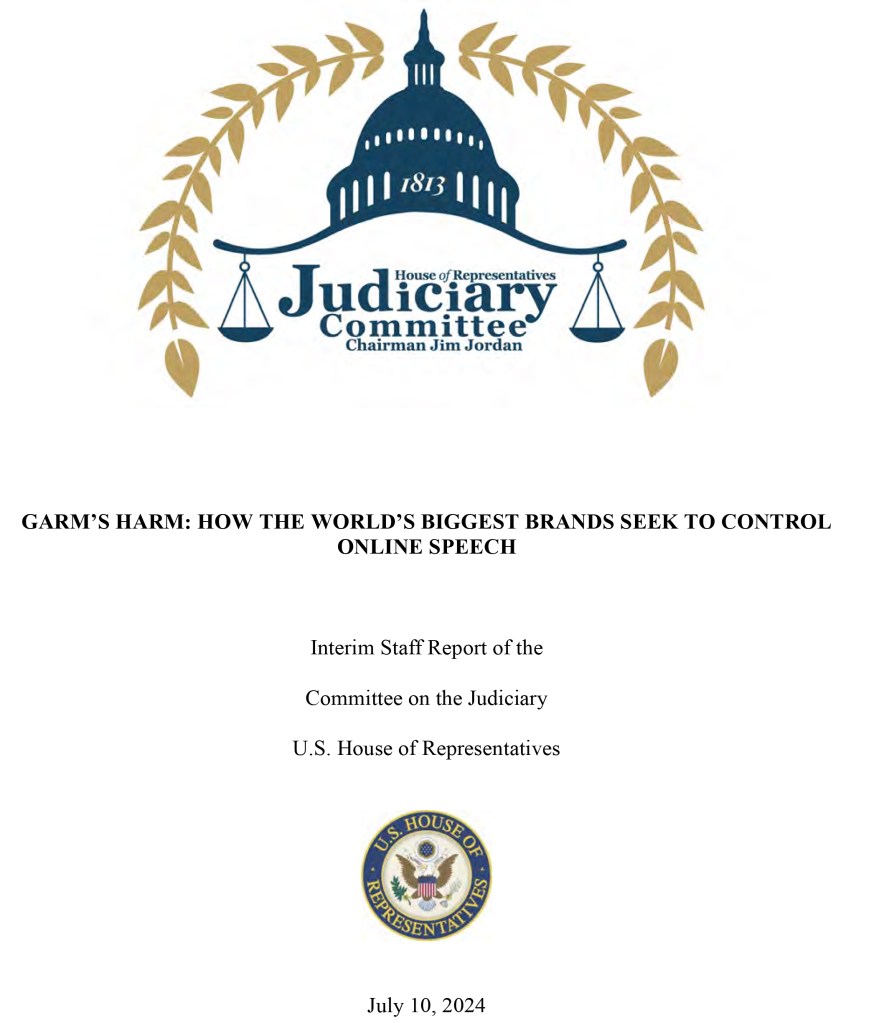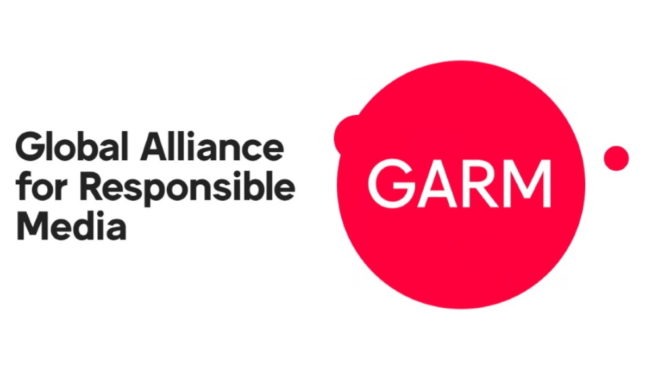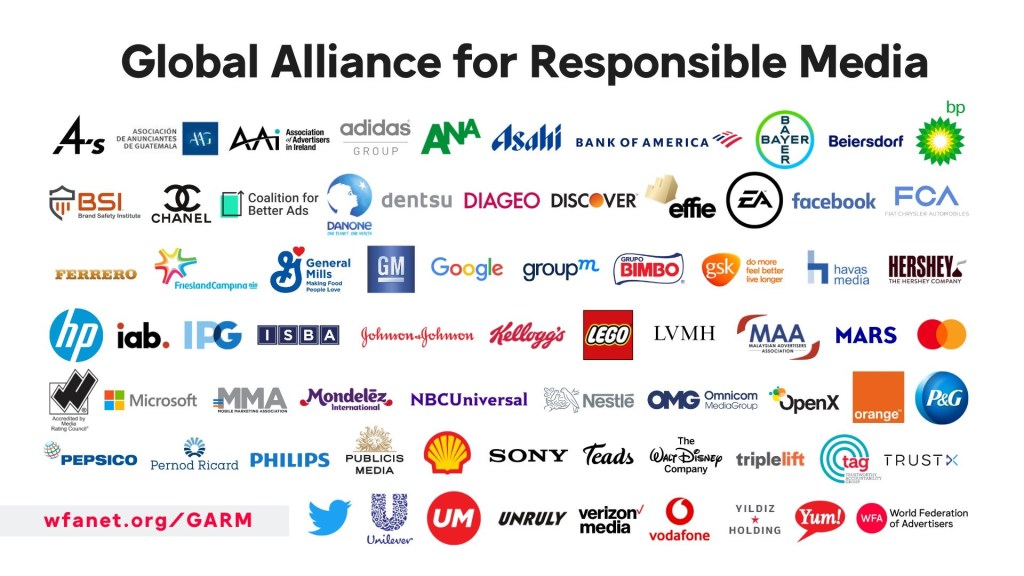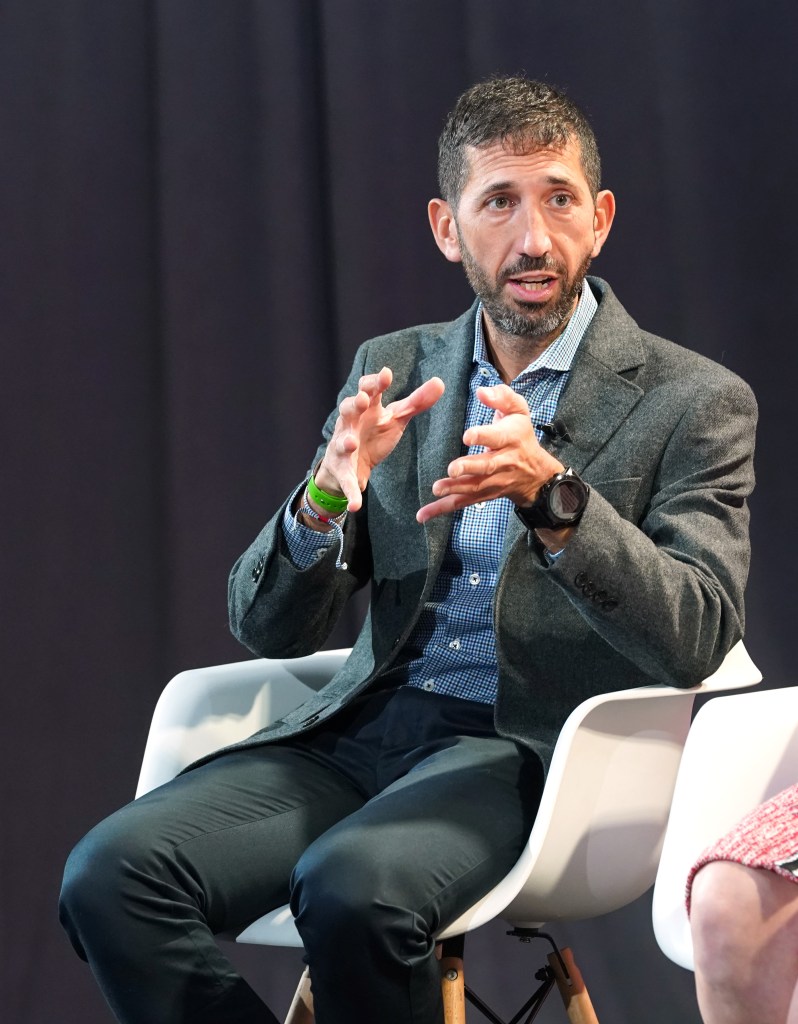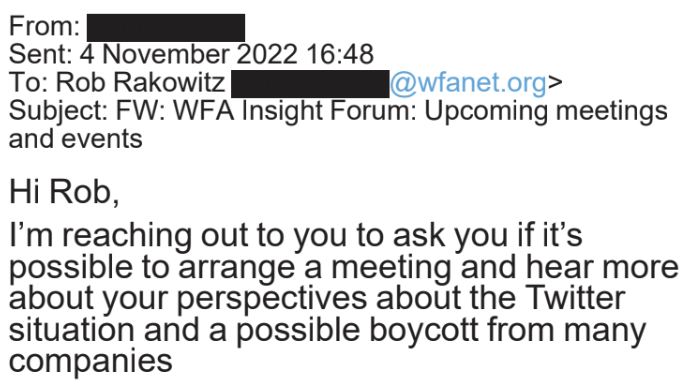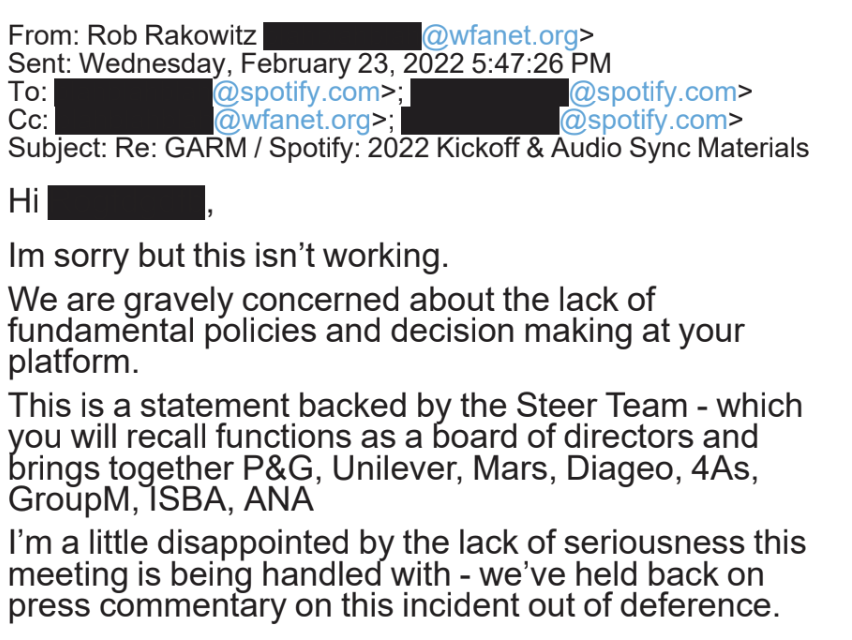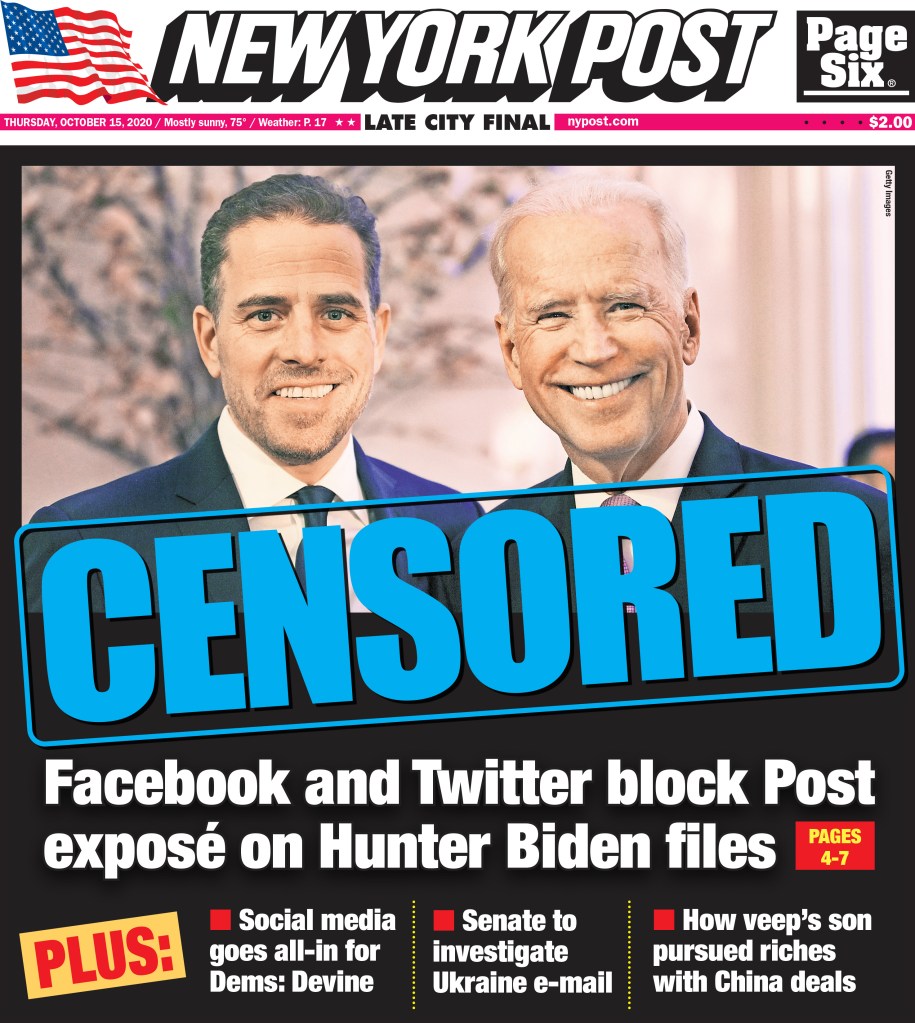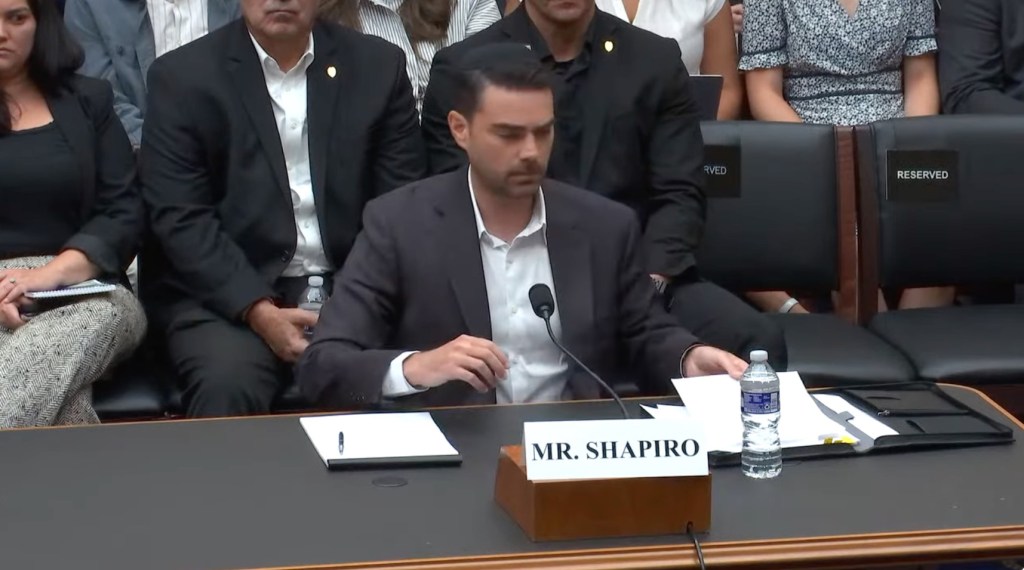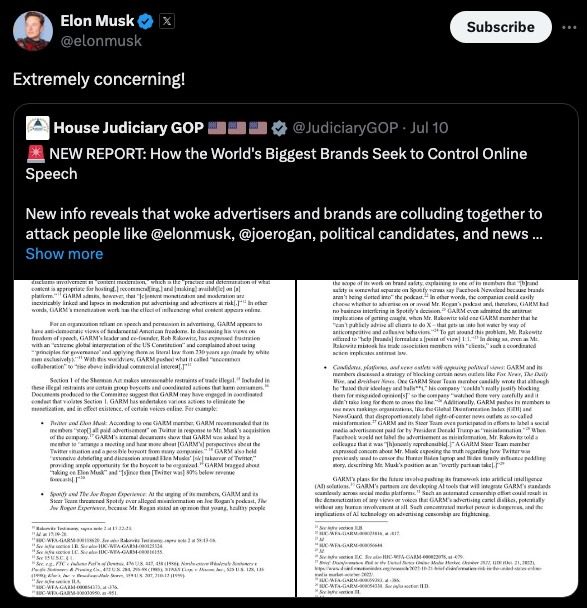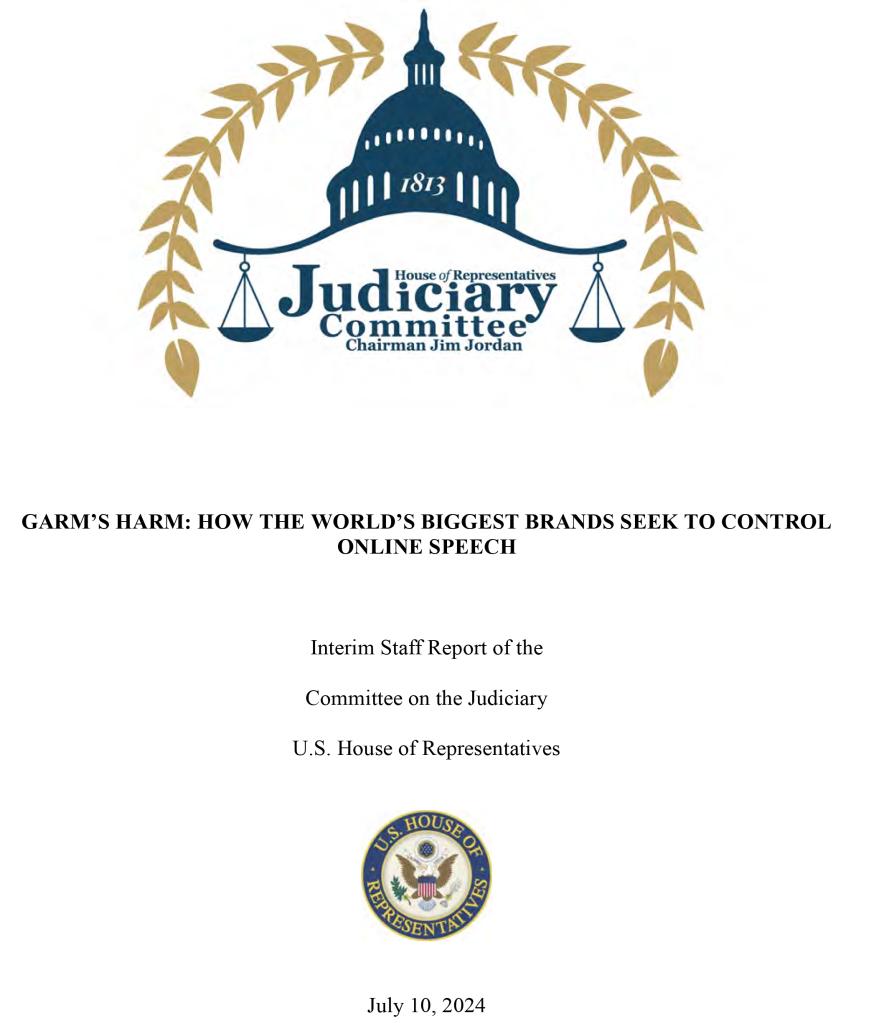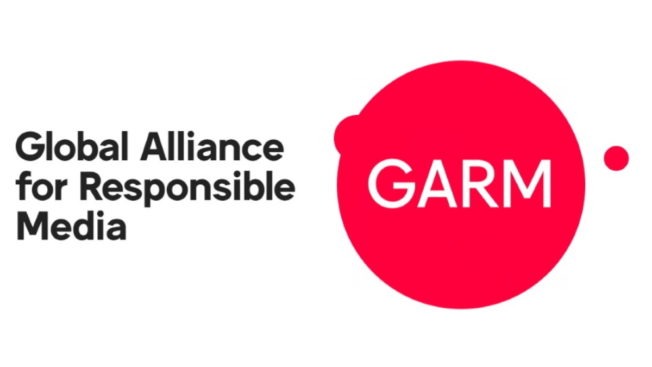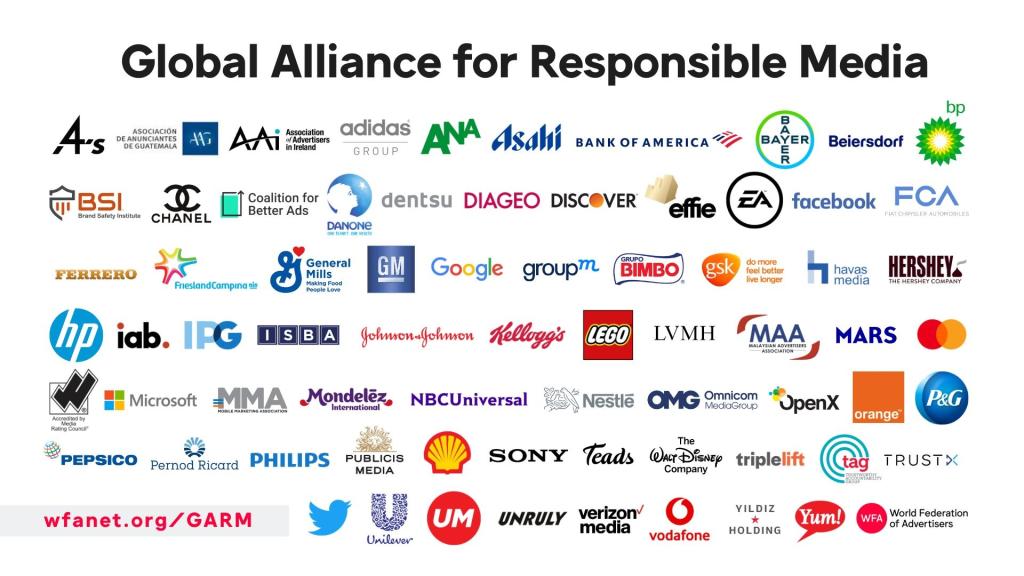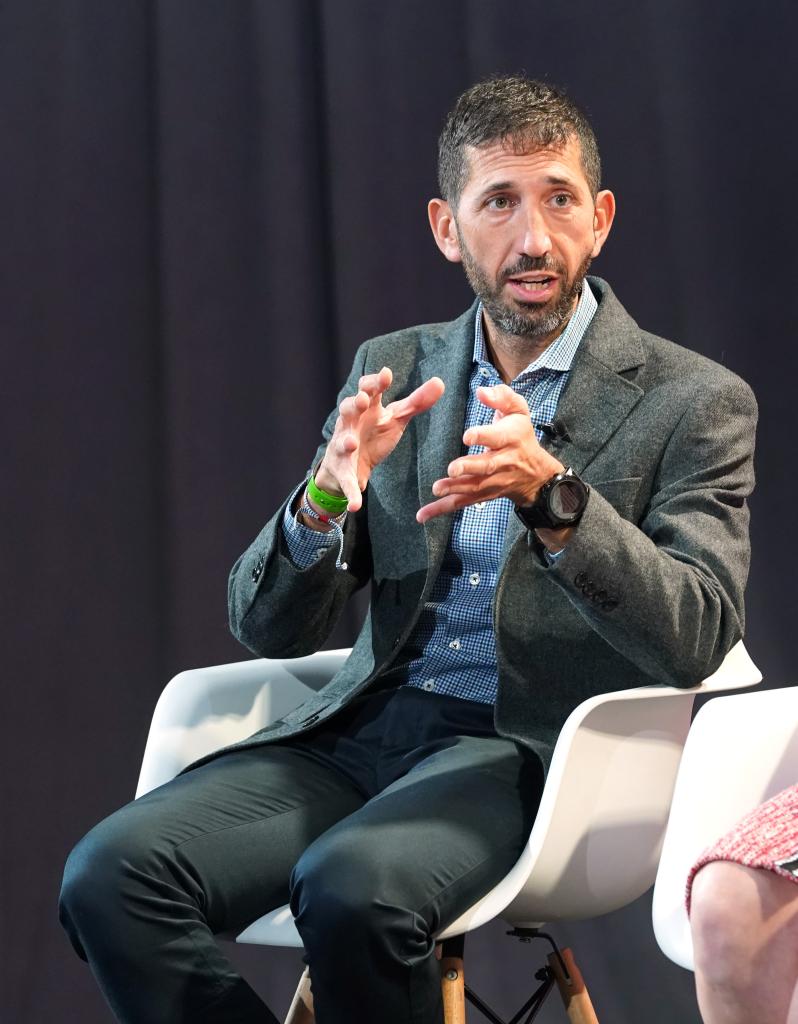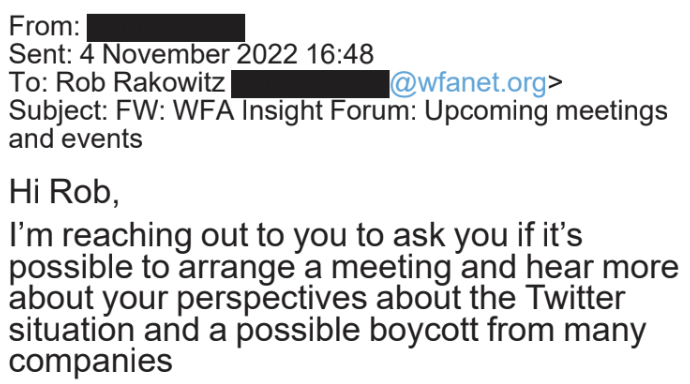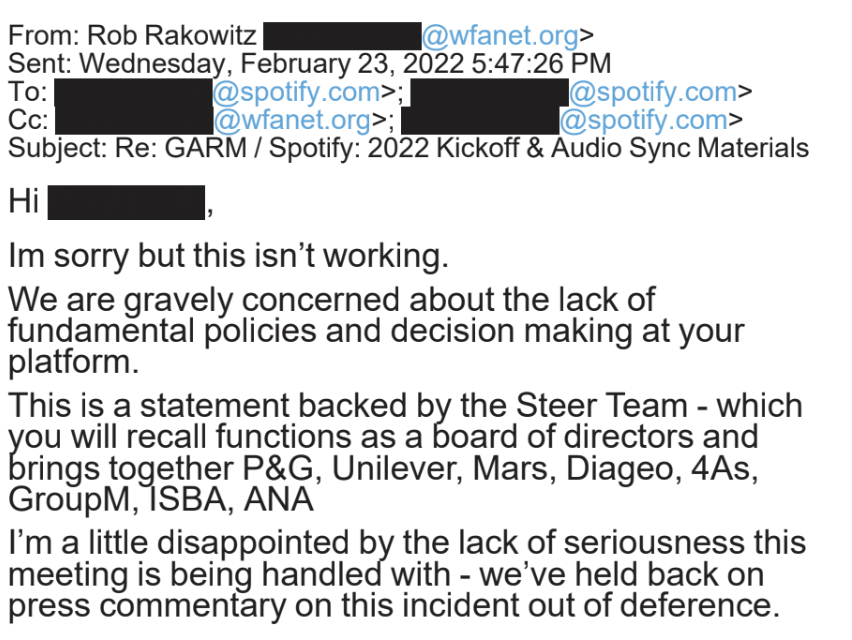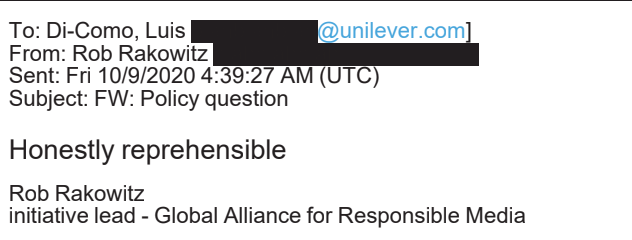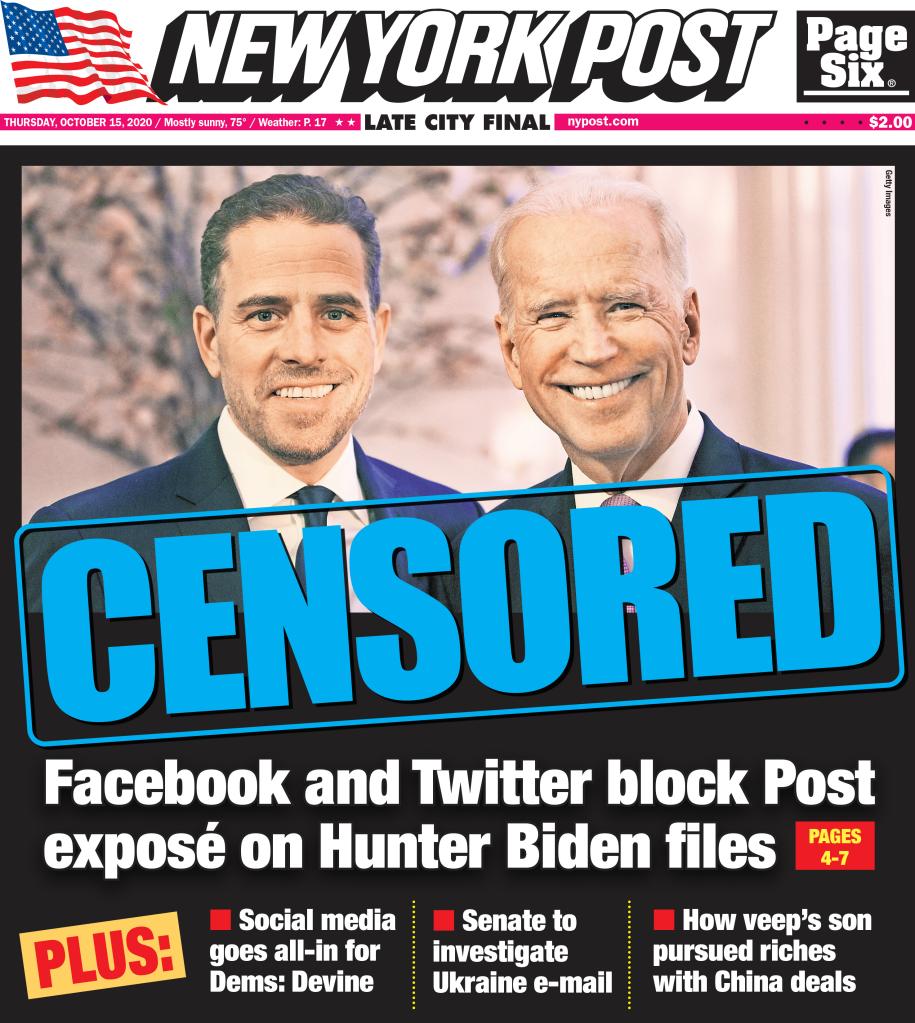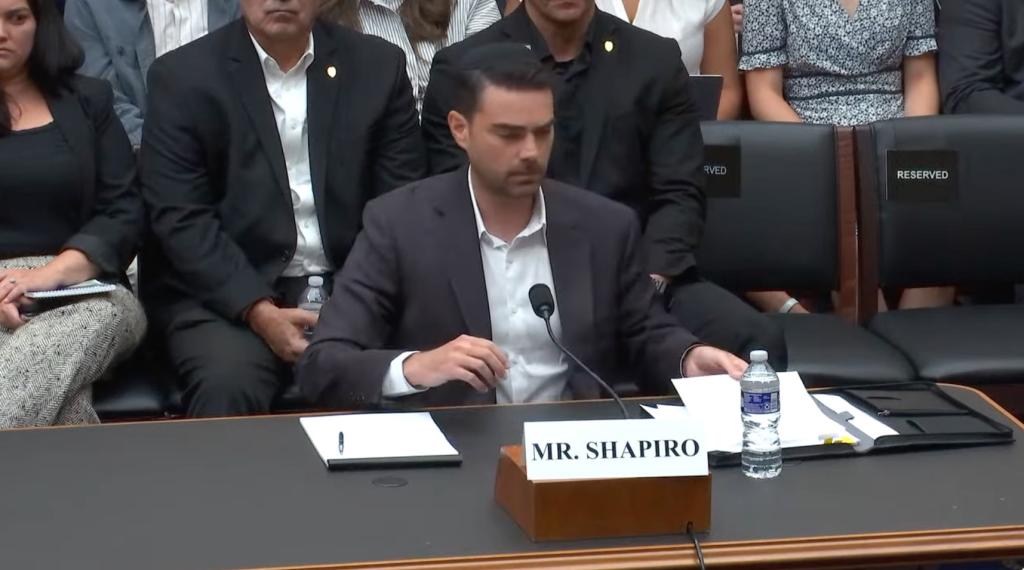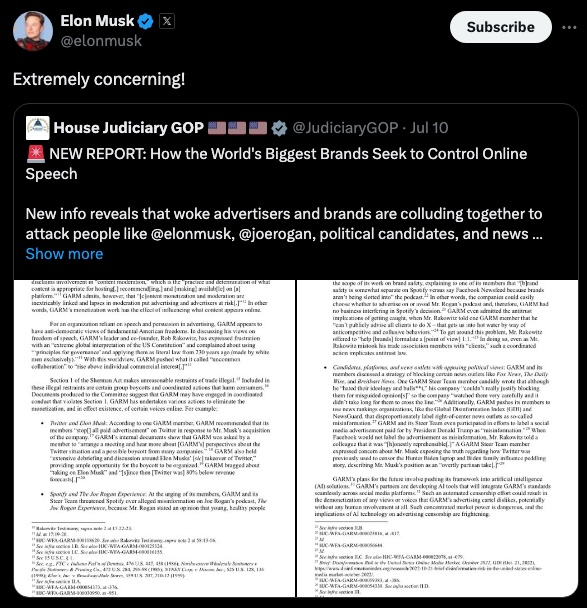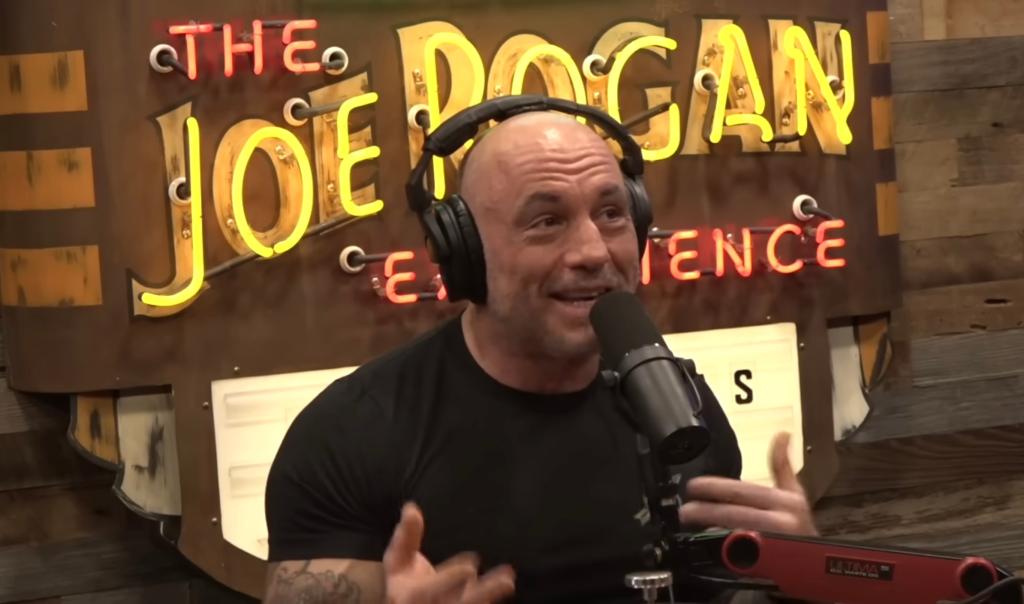Bombshell report details how a little-known corporate cartel targets outlets — including The Post — claimed to be spreading ‘misinformation’
WASHINGTON — A damning new congressional report shows how a little-known advertising cartel that controls 90% of global marketing spending supported efforts to defund news outlets and platforms including The Post — at points urging members to use a blacklist compiled by a shadowy government-funded group that purports to guard news consumers against “misinformation.”
The World Federation of Advertisers (WFA), which reps 150 of the world’s top companies — including ExxonMobil, GM, General Mills, McDonald’s, Visa, SC Johnson and Walmart — and 60 ad associations sought to squelch online free speech through its Global Alliance for Responsible Media (GARM) initiative, the House Judiciary Committee found in an interim report released Wednesday.
“The extent to which GARM has organized its trade association and coordinates actions that rob consumers of choices is likely illegal under the antitrust laws and threatens fundamental American freedoms,” the Republican-led panel said in its 39-page report based on internal organizational records.
“The information uncovered to date of WFA and GARM’s collusive conduct to demonetize disfavored content is alarming.”
House Republicans previously studied the extent to which the US government flouted free speech norms by leaning directly on platforms to censor content — through both the Biden White House and Department of Homeland Security — or by funding outside groups that compiled blacklists of outlets for advertisers to avoid.
The committee’s allegation of possible antitrust violations suggests a potential avenue for Justice Department action, especially if Donald Trump wins back the White House on Nov. 5.
‘Bewildering’ blacklist of The Post
The new report establishes links between the WFA’s “responsible media” initiative and the taxpayer-funded Global Disinformation Index (GDI), a London-based group that in 2022 unveiled an ad blacklist of 10 news outlets whose opinion sections tilted conservative or libertarian, including The Post, RealClearPolitics and Reason magazine.
Documents acquired by Congress show that some GARM members thought the GDI’s blacklist was bogus — with one employee writing that it was “bewildering” that the group “somehow placed the NYPost as ‘at most risk’ paper in the USA for disinformation.”
But additional documents show that the GDI’s blacklist was nonetheless promoted to WFA members as a tool to gauge misinformation and demonize disfavored outlets.
“[W]e do advise that platforms, ad-tech, agencies, use independent fact checkers to weed out mis-and-disinfo from supply chain and ad buys. GDI is one of many — NewsGuard, IFCN, etc,” Rob Rakowitz, WFA’s initiative lead for the GARM program, wrote in response to the employee who complained.
Conspiracy of censorship
A shocking House Judiciary Committee report shows how the World Federation of Advertisers, which represents most major corporations from L’Oréal to Nestlé to IBM, would use its power to withhold advertising from conservative news outlets and websites.
The WAF started an initiative, the Global Alliance for Responsible Media, headed by Rob Rakowitz, which would determine what sites were “safe” for advertisers, most often based on his own political views, the report says.
Twitter/X
After Elon Musk took over Twitter, a representative from Ørsted, a Danish energy company that was a member of GARM, wrote to Rakowitz proposing a boycott of the platform:
Later, Rakowitz takes a victory lap in an email, saying Twitter was “80% below revenue forecasts”:
Spotify
Rakowitz acknowledges that the advertisers he represents don’t appear on Joe Rogan’s podcast, but still was angry about the program and threatened Spotify with pushing a boycott and going to the press:
Then Rakowitz bragged — a minute later — that he’d “throttled” Spotify.
Rakowitz tried to get Facebook to censor a Donald Trump campaign advertisement. Bigs at the platform refused, which he called out as “reprehensible”:
Us too! New York Post
Rakowitz worked with a British nonprofit called the Global Disinformation Index, which was another group that called any conservative news site “disinformation.” It created a list of “safe” and “riskiest” sites. Rakowitz would ban the riskiest sites from carrying advertising — from, again, some of the biggest corporations in the world. A de facto boycott to destroy their businesses. The “riskiest” sites included the New York Post, Reason magazine, the Federalist and RealClearPolitics. “Safe” sites were liberal outlets like the Huffington Post and BuzzFeed.
In a separate email to GARM members, Rakowitz wrote that he wanted to “ensure you’re working with an inclusion and exclusion list that is informed by trusted partners such as NewsGuard and GDI — both partners to GARM and many of our members.”
Prior reporting shows the GDI received $100,000 from the State Department’s Global Engagement Center and $545,000 from the National Endowment for Democracy. Both government entities have said they don’t plan to provide additional funding after the GDI’s bias was exposed.
The GARM initiative was established in 2019 and undertook some of its most controversial efforts as claims of “disinformation” were being applied without evidence to reporting and hypotheses that later gained broad acceptance — such as The Post’s articles on abandoned laptop documents that link President Biden to his son Hunter and brother James’ foreign dealings, and the “lab leak” theory of the COVID-19 pandemic.
Internal communications suggest that rather than using an objective rubric to guide decisions, GARM members simply monitored disfavored outlets closely to be able to find justification to demonetize them.
One GARM member, John Montgomery, an executive at GroupM — the world’s top ad agency — wrote to Rakowitz in October 2021: “Before Breitbart crossed the line and started spouting blatant misinformation, we had long discussions about whether we should include them on our exclusion lists. As much as we hated their ideology and bulls—, we couldn’t really justify blocking them for misguided opinion. We watched them very carefully and it didn’t take long for them to cross the line.”
‘The Twitter situation’
Billionaire Elon Musk was one of the WFA’s top targets, according to the interim report.
“Documents obtained by the Committee show that GARM told its members to boycott advertising on Twitter after Mr. Musk’s purchase of the platform on October 28, 2022,” the report says.
A GARM member recommended that companies “stop all paid advertisement” on Twitter after Musk bought the platform, which he renamed X, with vows to respect diverse viewpoints after widespread political censorship under prior management.
Rakowitz bragged in a February 2023 email included in the report that “you may recognize my name from being the idiot who challenged Musk on brand safety issues. Since then they are 80% below revenue forecasts.”
Evidence that the WFA took active measures to undermine Musk’s stewardship of Twitter includes emails showing that Danish energy company Ørsted contacted GARM in late 2022 to discuss “the Twitter situation and a possible boycott.”
In an apparent smoking-gun follow-up, an Ørsted employee emailed Rakowitz and other WFA leaders on April 14, 2023, to say that “[b]ased on your recommendations, we have stopped all paid advertisement [on Twitter]” but added that it is “an important platform for us to reach our audience, so we would like to consider going back.”
Rakowitz denied in a deposition before the committee that he urged Ørsted to stop advertising on Twitter and an April 18, 2023, email he sent to the company indicates he pushed back on the idea.
Republicans said they didn’t buy the denial.
“Mr. Rakowitz’s denial of any wrongdoing, in the face of clear written evidence, is not credible for many reasons,” the report says.
“First, the Committee initially contacted GARM about potentially anticompetitive conduct on March 22, 2023, between the date of Ørsted’s initial email to GARM seeking advice on ceasing paid advertising on Twitter and the date of Mr. Rakowitz’s subsequent denial
“It is not surprising that Mr. Rakowitz sent an email disclaiming his recommendation for a boycott after being put on notice that GARM’s actions were of interest to the Committee.”
‘Throttled’: Spotify and Joe Rogan
Comedian, UFC commentator and podcaster Joe Rogan was among the top targets of GARM and member ad associations, including GroupM, due to his encouragement to young listeners to rethink getting COVID-19 vaccine shots.
“In late-January 2022,” the report says, “Spotify met with Joe Barone, Managing Partner Brand Safety Americas, of GroupM … to discuss so-called misinformation on Spotify.”
“The alleged misinformation offered by Mr. Rogan was twofold. First, on the April 23, 2021, episode … [he] told his guest, comedian Dave Smith, his views about the COVID-19 vaccine: ‘You’re 21 years old and you say to me should I get vaccinated?’ I go, no’….. Second, on December 31, 2021, Mr. Rogan featured Dr. Robert Malone, an early mRNA researcher and COVID-19 vaccine skeptic, on his podcast. While YouTube removed the episode, Spotify refused to take it down.”
Spotify was attempting to join GARM at the time of the controversy and GroupM threatened to hold up the process, according to the records.
According to the report, GroupM’s interest was purely in getting Spotify to bend to its will and censor Rogan’s controversial opinions, because none of its clients advertised on “The Joe Rogan Experience.”
Barone confirmed that fact in an email dated Jan. 27, 2022, in which he told his colleagues that “GroupM does not buy Joe Rogan, and therefore we had no client exposure[.]”
However, Barone added, he had told Spotify that the content on “The Joe Rogan Experience” podcast “put all of Spotify’s advertising with GroupM clients at risk.”
With that in mind, Barone wrote, he had told Spotify that GroupM would “conduct a complete Trust & Safety review of the Spotify platform and policies” and “begin that process immediately.”
The next day, Barone forwarded his email to Rakowitz and the two agreed to discuss the issue with GARM’s Steer Team, which Rakowitz said “functions as a board of directors and brings together P&G, Unilever, Mars, Diageo, 4As, GroupM, ISBA, ANA.”
The next month, Spotify CEO Daniel Ek attempted to set up a meeting with Rakowitz, on the condition that the meeting only be between Spotify and GARM, while Rakowitz wanted to invite the Steer Team.
Amid the impasse, Rakowitz accused Spotify of a “lack of seriousness” and said he was “gravely concerned about the lack of fundamental policies and decision making at your platform” before threatening to go to the press, warning that if “we’re unable to connect and discuss the issues we’ll only be able to comment with what we’re able to glean.”
Rakowitz allegedly forwarded that email to both Barone and a fellow Steer Team member, former Mastercard ad consultant Ben Jankowski, with the single word: “Throttled[.]”
In response, Jankowski said Rakowitz’s Spotify contact “needs a smack.”
Rakowitz later told the House committee that by “throttled” he meant to write that he was “frustrated” with the course of negotiations, an explanation the panel also rejected.
“This after-the-fact rationalization defies common sense, as one definition of throttled is ‘to defeat,’ which comports with the threatening nature of Mr. Rakowitz’s email,” reads the report. “Mr. Rakowitz’s claim is especially incredible because he had earlier emailed Mr. Barone, writing ‘I’m about to throttle this guy[.]'”
‘Reprehensible’ Trump ad
During the 2020 presidential campaign, an executive at Unilever — the parent company of Ben & Jerry’s, Hellman’s and Lifebuoy soap, among other brands — flagged a Facebook ad paid for by Donald Trump’s re-election campaign.
The ad, which suggested that Joe Biden was wearing an earpiece during the first presidential debate between the two men, was defended by Facebook, which said the spot didn’t violate its anti-misinformation polices “which are heavily weighted to protecting people from real world harm.”
Facebook also noted that because the ad was placed by a presidential campaign, “it is not eligible to be factchecked.
“We believe people should be able to see what politicians are saying so that they can hold their elected officials accountable and make informed decisions about who will lead them,” the social media giant said. “Political ads from presidential candidates receive intense public scrutiny and are placed in our public Ad Library for seven years.”
That explanation wasn’t good enough for Rakowitz, who had been looped in on the exchange by Unilever executive vice president of global media Luis Di Como and emailed him that the Facebook policy was “Honestly reprehensible.”
Under questioning from the panel, Rakowitz claimed he was worried about a “lack of consistency on policies” and “having different policies and not having a clear line.”
The committee disagreed again, writing in its report that “Facebook’s policy on political advertisements … seems perfectly clear: Facebook does not fact check advertisements by political candidates because ‘people should be able to see what politicians are saying so that they can hold their elected officials accountable and make informed decisions about who will lead them.’
“Mr. Rakowitz’s response, ‘Honestly reprehensible,’ also seems perfectly clear: Mr. Rakowitz thought that Facebook should have labeled President Trump’s campaign advertisement as misinformation.”
Fox News ‘calling for the murder of protesters’
It wasn’t just politics that drew the wrath of the WFA and GARM. In November 2021, after Kyle Rittenhouse was acquitted of homicide and other charges in the deaths of two rioters during violence in Kenosha, Wis., in the summer of 2020, a GARM member attacked Fox News’ coverage of the case.
“[W]e can have all the diversity initiatives in the world, but we are fatally undermined if we do not call these narratives on ‘mainstream’ broadcast media as well as on the platforms,” this person wrote.
A WFA consultant responded on the same email chain that the cable news giant had been “praising or calling for the murder of protestors.”
In response, WFA CEO Stephan Loerke agreed, writing: “From a brand-owner perspective, the reasoning which has led us to put pressure and hold to account platforms on hate speech and harmful content should also apply to a media owner. We’ve always made it clear that the standards which we [GARM] want to see platforms enforce should be valid irrespective of media.”
Loerke added, according to the report, that he would convene the GARM Steer Team to “discuss the issue — that is, condemning Fox News’s news gathering and reporting.”
The outcome of that discussion, or even if it took place, is unclear.
GARM said in a statement following release of the report that it “has continually demonstrated that it will cooperate with the House Judiciary Committee in good faith.”
“The report released on July 10th does not include the 168-page transcribed interview which effectively clarifies questions on GARM’s adherence to competition law policy and practices, that GARM is a voluntary organization, and that guidance from GARM is non-binding,” a rep for the group said in an email, along with an attachment to that document.
“We remain steadfast in the conviction that GARM enhances transparency in previously opaque practices relative to ad placements in digital social media,” the statement said.
“GARM creates voluntary industry standards on brand safety and suitability which media sellers and ad tech companies can voluntarily adopt, adapt or reject. This in turn allows advertisers to make choices similar to the way they buy advertising in TV, print or radio. GARM’s work focuses on voluntary monetization standards while establishing voluntary steps to improve transparency on content moderation and platform design.”
“In consultation with legal counsel, WFA maintains robust and effective compliance policies designed to enhance competition,” the response went on. “These policies, along with other materials and information provided to the House Judiciary Committee corroborates that GARM has been diligent in always driving a voluntary and pro-competitive approach and that the allegations against GARM for anti-competitive behavior are baseless.”







